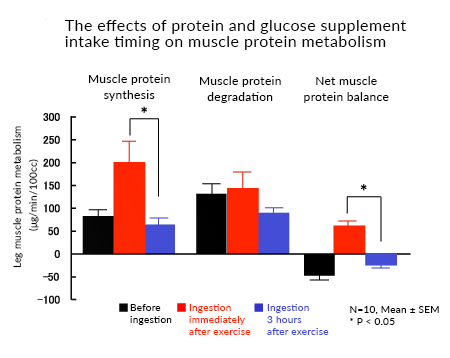Postexercise nutrient intake timing in humans is critical to recovery of leg glucose and protein homeostasis
Levenhagen DK, Gresham JD, Carlson MG, Maron DJ, Borel MJ, Flakoll PJ
American Journal of Physiology - Endocrinology and Metabolism 2001; 280: E982-E993
Objective
To examine the effects of post-exercise protein and glucose supplement intake timing on muscle protein metabolism.
Methodology
Ten healthy subjects (5 males, 5 females) were each given a protein and glucose supplement (10g of protein, 8g of glucose, 3g of fat) respectively immediately after exercise and three hours after exercise, and a crossover study performed. Immediately after a one-hour recumbent bicycle exercise (at 60% of VO2) or three hours thereafter, subjects were given a protein and glucose supplement, and muscle protein metabolism evaluated three hours after consumption using a stable isotope labeling (2H5 -Phe) method to measure arteriovenous difference*.
- *Arteriovenous difference measured using stable isotope labeling Phe (2H5 -Phe): not only a measurement of tissue protein balance (intake amount/expelled amount), but an evaluative methodology whereby the speed of protein synthesis and proteolysis are assessed. Using this methodology allows for evaluating whether changes in muscle protein balance are the result of muscle protein synthesis or skeletal muscle proteolysis.
Results
A comparison of results when taking a protein and glucose supplement respectively immediately after exercise and three hours after exercise found that muscle protein synthesis was greater when the supplement was taken immediately after exercise, yielding a net gain.
Conclusions
The results suggest that consuming protein and glucose supplements immediately post-exercise is effective in increasing skeletal muscle mass.









